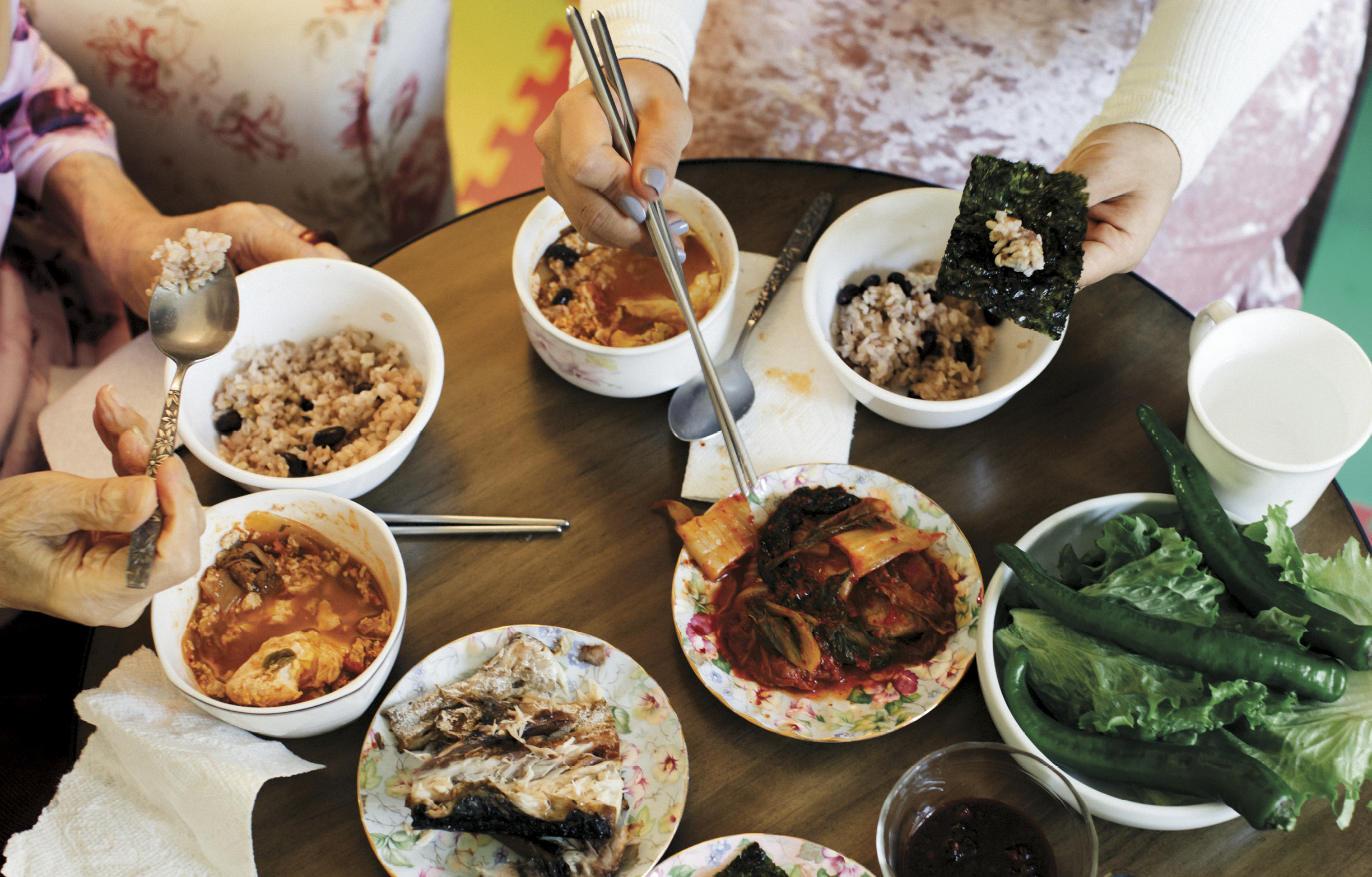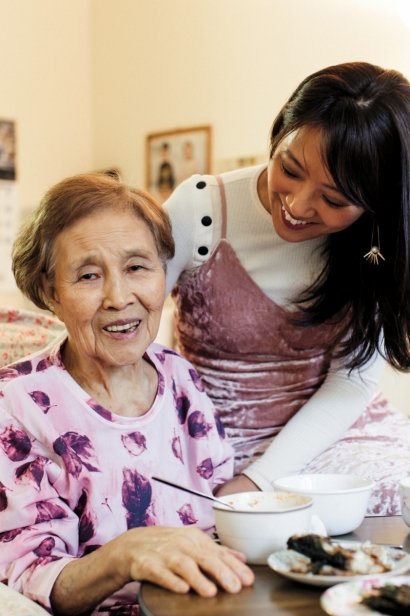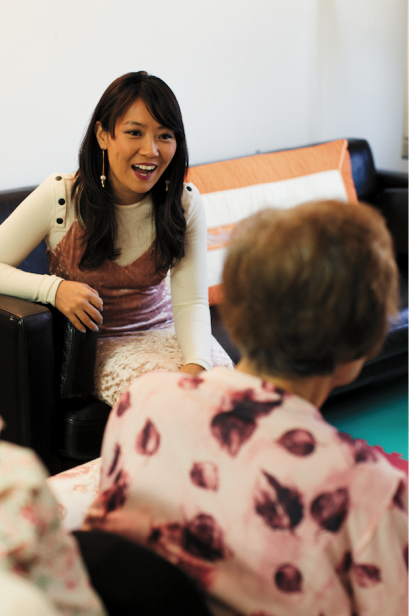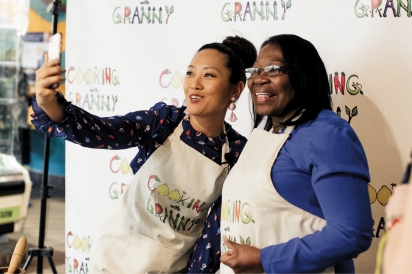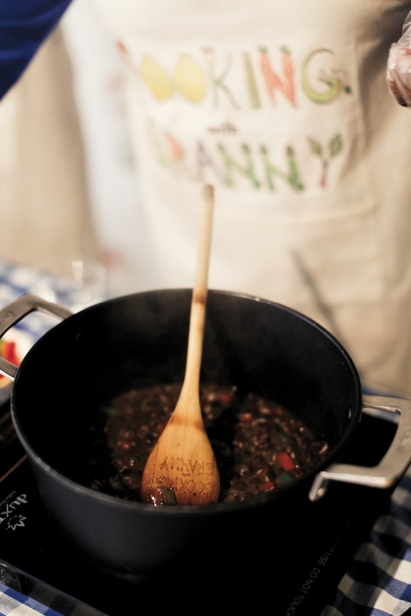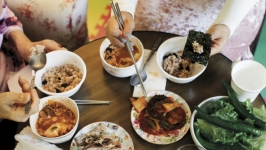Web Series ‘Cooking with Granny’ All Started With Granny’s Kimchi
If you’ve lost a loved one, you know that pang of regret. If you’d just had more time, you would have learned those stories and recipes that are now irretrievable. Flushing native Caroline Shin grew up with an urgency about that very thing, and it was the impetus behind her award-winning, documentary-style web series, “Cooking with Granny,” starting with her own kimchi-queen Korean grandma, Sanok Kim, in 2011. The show began in earnest in 2014 when Shin launched a Kickstarter and asked people to nominate their own grannies.
Studying journalism at Brown and Columbia, producing videos for New York magazine—it was all in service of eventually telling the stories of immigrant grandmas. In each episode, Shin interviews a granny about her life and struggles, what brought her to the United States. She often films a grocery trip and learns how to cook an heirloom recipe. The grandmas featured run the gamut—there’s Congolese Grandma Lusamba’s cassava leaf stew, Yaya Barbara’s Greek octopus stew and Grandma Sahni’s Indian mattar paneer, just to name a few. We met with Shin to talk growing up in Flushing, researching matriarchs and what’s next (a possible cookbook?).
Edible Queens: What inspired “Cooking with Granny”?
Caroline Shin: All these experiences I had as a kid: Growing vegetables in our garden, grocery shopping with her [Shin’s grandmother]. But what moved me on a deeper level was the stories my grandma told. She’s from North Korea. She survived a terrifying experience in her early 20s, physically walking over dead bodies with a baby.
It was an intrusive, abusive dictatorship, so the fact that my grandma lived through that… After she crossed over to South Korea, she never saw her parents or siblings again. As a kid, I knew I would do something around my grandma’s story; I just wasn’t sure how it would manifest. Would it be a video series, would it be a book? I didn’t know, but I knew it was something I wanted to do.
EQ: Tell me more about cooking with your grandma.
CS: We’d walk around Flushing foraging. We had a garden where we grew tomatoes and squash. I’d help her mash garlic. Just watching her; it all smells so good, and the colors and the chili peppers, vibrant red. The process itself is tantalizing because you see things congeal, or bubble, or change color and at the end you’re treated to something delicious.
EQ: What was it like growing up in Flushing?
CS: In elementary school we had culture days, and I remember the first time I had Italian food. This guy named Billy brought his mom’s homemade Italian sauce and bread for dipping. I was hooked. I became close with my next-door neighbors from Italy. They grew tomatoes, and in their garage, three walls were just all the mom’s jarred tomato sauces. They also grew zucchini, so my first fried zucchini blossoms were from her. So, culture for me wasn’t so racialized, because they looked very white. But the culture came from them being and having immigrant parents.
It was this multicultural potluck. That tomato sauce changed my life—because Korean food was my life. I would go over to my best friend’s house. She’s Jewish, Eastern European roots, but it was her grandparents who were immigrants. So her parents were first generation. I would go there and have a mix of more standard American foods, plus Jewish foods. I remember my first matzo ball soup. Again, it changed my life!
EQ: Being that CWG tells immigrant stories, there’s an inevitable political undertone to the show; these are stories of trauma and hardship.
CS: The human stories are often disregarded when you talk about immigration. It’s this deeply politicized, divisive topic now, but at the same time there’s this trend of multicultural foods becoming mainstream. The people who have been authentically cooking this stuff; they should get the spotlight. Our grandmothers are good cooks because of traditional gender roles. Domestic responsibilities fell on women, so that’s what you had to do, whether you wanted to or not. And domestic duties have always been taken for granted in any household, no matter where you are, whether it’s 2017 or the 1960s.
Some chefs get accolades, but they say they were inspired by their moms and grandmas, so it’s about giving voice to these women—immigrant women, women of all different colors. I wanted to celebrate people who weren’t getting the accolades.
EQ: It must be difficult researching grandmas, no? Because it’s not like grandmas have Instagram. You have to ask people about their grandmas.
CS: Thank-you for picking up on that. It’s so hard to find grandmas [laughs]. That’s exactly what you have to do because they’re not on LinkedIn, and they’re not on Instagram like, “I’m a grandma who likes to cook.”
They ask, “Why would you want to feature me? It’s nothing.” But there’s something of great cultural and family value. It’s cute after I do an episode. Families come up to me and they’re like, I didn’t even know this story. That’s happened with almost all of the grandmas. And for a lot of them, it’s the first time there’s been so much emphasis placed on what they’ve experienced.
EQ: Would you ever be interested in getting picked up by a mainstream channel, to introduce CWG to a broader audience?
CS: What I like now is that I have so much creative control over what stories are being told, the grandmothers being cast. Not having had any experience working with a big network, I don’t know what limitations they would put, but yes, I definitely would.
Caroline Shin | @carolinestoriesnyc
Cooking with Granny | @cookingwgranny


